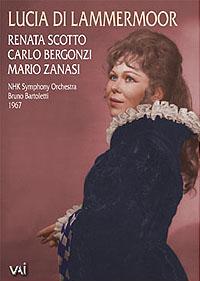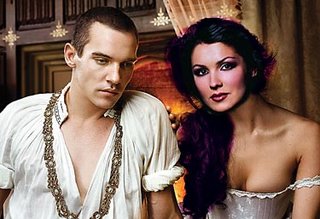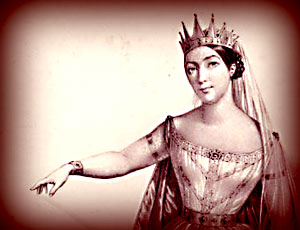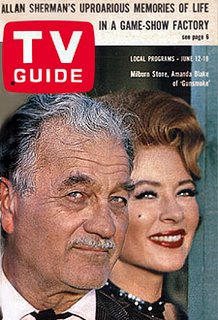Guest critic
Niel Rishoi reviews the VAI DVD release of
Lucia di Lammermoor
.

OK, this is IT. Barring the cuts, this is the Lucia of
Gaetano Donizetti. Not that misguided travesty at the Met, not
Natalie Dessay's vocally juddery overwoughtness. No schtick, no
Carol Burnetting around. Just Donizetti and Cammarano's Romantic drama, pure and simple. Real artists, real singers. Performing it straight, as if their lives depended on it. No gimmicks. No BS. You watch this 40 year old performance, and you see and hear a kind of authority and rightness of approach that just doesn't happen often nowadays Here we have music. Here is all the garlic, red wine, passion and organic Italian musical DRAMA. The action contained within the singing. It's a miracle, nothing less.
The picture is a bit grainy, the sets standard issue. Does it matter? Give me a break (NO).
We start with
Bergonzi. Tenore supremo. Short, stumpy (yet handsome here), gestures of stock vintage. Yet, he creates drama through voice alone;"Vi disperda!" cuts right to the bone. Debonair in the old-fashioned manner. Ardent, the ultimate tenor hero. Perfect. Voice, voice voice - in awesome form here. "Fra poco a me ricovero" just splendid: it's met with a roaring ovation. Bergonzi and
Scotto do not have the sensual interplay of
Ricciarelli and
Carreras - they don't make a lot of eye contact and are sometimes hilariously buried in their own "work" - but they are together all the way vocally and musically.
Zanasi. "Another" Italian baritone of his time, extinct today. A darkly handsome man, he has a commanding presence. He sings a solid "Cruda, funesta smania," beginning with a slightly muscular overemphasis, yet it suits the piece; but the line, upper extensions of ease, and expression is just right.
Plinio Clabassi. A Raimondo of unusually fine caliber, with a mellow, steady, consummately produced tone - he evinces a genuine control over it, and uses it flexibly - no park and bark approach here. Moreover, he makes the character figure prominently: he really delivers a tale in his "Dalle stanze, ove Lucia," setting up the mad scene fittingly.
Whoever said Scotto was a second-stringer should be thumped on the head, then made to hasten and acquire this release. She is spectacular, nothing short of miraculous here. What may have been accepted as standard then registers as something extraordinary now. Scotto is in marvelous voice: that brisk, tangy sound, slightly piercing on high, is bracingly clear, pure and perfectly steady throughout. She has never sounded more appealing, nor so classically Italianate in tone and manner. Her coloratura, while not of
Sutherlandian velocity, is neat, in place, and confidently deployed. Trills are not a prominent thing of disctict articulation, yet they are discerned - and importantly, uses them effectively in the line where called for. High notes pop out quite strongly. What's most important here is she does that all-important shaping and binding of lines into an expressive whole; she has a way of magically "dropping in" and connecting phrases, with a wide range of dynamics, and her diction is an absolute joy - no alteration of vowels or slushing over of them. She makes every word clear, and meaningful. The line in "Regnava nel silenzio" is ideal, true, unfussed, yet so very sustained on a level of gripping narrative. "Verranno a te sull'are" is pristinely, gorgeously sung, as is "Soffriva nel pianto." This kind of cantabile singing should be taken heed by any budding Lucia today.

But what is most especially distinctive is that in each isolated number, she tells a
story. You see in her face, the spontaneity of her delivery of the words and expressions, how they register upon the listener as internal thoughts, given out to the audience. What's most important here, though, is that she is so
not trying to force external gimmicks onto the characterization. The question never forms in the mind, what kind of a character
is Lucia? A spineless wimp? Sick from the start? A mad hatter? No, the Lucia here is one that uninformed individuals will never understand: she is a 19th century Romantic heroine, a girl in love with Edgardo. Scotto reacts in each episode as if the character were hearing the statements of the others in the story for the first time. It has a uniquely-alive spontaneity, unusually free of calculation. I'm sick of the discussion of whether Lucia is mentally ill from the start, based on her occult meanderings in "Regnava nel silenzio;" if anyone knew of literature, religious superstitions and so forth of that time, these were conventional devices in Romantic melodramas. Ghosts and apparitions are commonplace. So, then, Scotto just accepts Cammarano's text, and tells it without any manipulation or presumption. She or we do not think Lucia mentally ill from the get-go.
Scotto's emotional honesty never falters, not once. She is convincing in the scene with Enrico, bringing just the right amount of anguish, her reactions often touching; in "Se tradirmi," you see her pleading to God most plausibly. In the wedding scene, Scotto is riveting, and does what
Mariella Devia had a hard time establishing in her La Scala 1992 video: show the abject despair and desolation of Lucia, as the hope drains out of her. Devia has the astounding vocal technique that kept her singing better longer, but she does not have, by a considerable margin, Scotto's all-abiding charisma and out-there personality. Back to the Wedding Scene: the sextet, onto the end of the act, just sizzles and explodes with drama - those voices just pour out with thrilling abandon. Exciting stuff, this.
After all my extravagance of description, I'll have to think of ways to go further concerning the Mad Scene: it's a revelation. One of the best, hands down, I have ever seen performed. Every American soprano and all directors should watch this. This is how it should be done. In the service of the music, no gimmicks.
Scotto is in her element. Intensely musical, letting the scene flow with astonishing naturalness. Again, she's telling a story. The audience doesn't see this, but the TV viewer does: close-ups reveal the soprano absolutely into her music/storymaking. Scotto has the audience confidently in the palm of her hand, but not for a moment is she calculating or manipulative: it is, rather, an artist in full sureness and specific aim in what she is doing - she's fascinating to watch at every point, you can't take your eyes off her. She's living the situation moment by moment. We get no hysterics, no forced "mad acting" or cheap effects (which I despise). Lucia is totally removed from reality, in her childlike state, moving around like a little ghost in her own little but all-consuming world. Apart from a few moments of fright (the "il fantasma" sequence is powerful), she's deliriously happy, living out her bliss with Edgardo. Most of all, though, finally, you get the full power and pathos of what Donizetti intended. Scotto weds the text with the music so skillfully so that you get the full effect how how beautifully they complement each other. She does not allow the music to be compromised, so she takes care to make all the actions fit in, rather than standing out, as is the wont of too many a soprano. Scotto's bravura accomplishment is a triumph, and what a fortuitous circumstance that these documents exist, and that we have privy to them.
The bows and biz in the lengthy applause after the flute with cadenza, is however, pure Scotto. She steps out of character to acknowledge the ovation. No objections at all; it is decidedly part of the show. Very much like
Cossotto, oh thank thank you, oh so humble me but I deserve it. I'm beginning to think these kinds of self-possessed artists, who don't display false modesty very well, are the lastingly memorable artists. Infinite self-belief, a healthy dose of the imperious ego, wanting to please, absolutely certain of their merit, and a kind of inborn dementedness: it translates into a very personal charisma, which defines who they are. They're to be preferred. We want personalities, a personal statement, an individual MO. Wallflowers, generic, unidentifiable, pedantic, please go home.
Without a doubt, this is the video
Lucia of choice. Even though it's cut, it retains and fleshes out the truest spirit of the piece. --
Niel Rishoi VAI DVD 4418
Lucia: Renata Scotto; Edgardo: Carlo Bergonzi; Enrico: Mario Zanasi; Raimondo: Plinio Clabassi; Arturo: Angelo Marchiandi; Alisa: Mirella Fiorentini; Normanno: Giuseppe Baratti. NHK Symphony Orchestra, Bruno Bartoletti. Japan, 1967.
Labels: bel canto, guest critic, scotto, telecast

 La Cieca is loath to scoop dear Bradley Wilber, but rumors are swirling once again about future seasons at the Met. Perhaps the most controversial (among the cher public, at least) of these plans is a new production of Anna Bolena to open the 2011 season, with Anna Netrebko's pretty head on the chopping block. Further casting at this point is not set, though La Cieca is confident that speculation will run rife in the comments section.
La Cieca is loath to scoop dear Bradley Wilber, but rumors are swirling once again about future seasons at the Met. Perhaps the most controversial (among the cher public, at least) of these plans is a new production of Anna Bolena to open the 2011 season, with Anna Netrebko's pretty head on the chopping block. Further casting at this point is not set, though La Cieca is confident that speculation will run rife in the comments section. OK, this is IT. Barring the cuts, this is the Lucia of Gaetano Donizetti. Not that misguided travesty at the Met, not Natalie Dessay's vocally juddery overwoughtness. No schtick, no Carol Burnetting around. Just Donizetti and Cammarano's Romantic drama, pure and simple. Real artists, real singers. Performing it straight, as if their lives depended on it. No gimmicks. No BS. You watch this 40 year old performance, and you see and hear a kind of authority and rightness of approach that just doesn't happen often nowadays Here we have music. Here is all the garlic, red wine, passion and organic Italian musical DRAMA. The action contained within the singing. It's a miracle, nothing less.
OK, this is IT. Barring the cuts, this is the Lucia of Gaetano Donizetti. Not that misguided travesty at the Met, not Natalie Dessay's vocally juddery overwoughtness. No schtick, no Carol Burnetting around. Just Donizetti and Cammarano's Romantic drama, pure and simple. Real artists, real singers. Performing it straight, as if their lives depended on it. No gimmicks. No BS. You watch this 40 year old performance, and you see and hear a kind of authority and rightness of approach that just doesn't happen often nowadays Here we have music. Here is all the garlic, red wine, passion and organic Italian musical DRAMA. The action contained within the singing. It's a miracle, nothing less.
 La Scala's 2007-8 opera season opened last night (December 7) with a new production of Tristan und Isolde. The Milanese theatre hadn't presented Wagner's masterpiece since 1978, when Carlos Kleiber's masterful interpretation became an instant classic, in spite of a not-so-sensational cast (Wenkoff, Ligendza, Baldani, Moll).
La Scala's 2007-8 opera season opened last night (December 7) with a new production of Tristan und Isolde. The Milanese theatre hadn't presented Wagner's masterpiece since 1978, when Carlos Kleiber's masterful interpretation became an instant classic, in spite of a not-so-sensational cast (Wenkoff, Ligendza, Baldani, Moll). Act 3 is where it really falls apart. Scene 1: Lightning out of your local carnival's "spooky house" housed in a black scrim that materializes into Wolf's Crag Castle thanks to two cutouts at top and bottom with part of the Scene 2 stairs sticking out. Edgardo enters to a bare stage with your uncle's ugly yellow wing backed chair the only piece on stage. Scene 2 was the most confusing - the costumes, giant wooden stairs and balcony (read faux-finished cat walk) seemed to place the scene in the Wild West and looked to be straight out of Miss Kitty's Saloon from Gunsmoke!! Perhaps up close the impression was richer, but from my seat it sure didn't read as Scotland. The Ravenswoods cemetery was a particular embarrassment - 2 or 3 cutout headstones that looked to be supported in the back by 2x4's. Cheap cheap CHEAP!
Act 3 is where it really falls apart. Scene 1: Lightning out of your local carnival's "spooky house" housed in a black scrim that materializes into Wolf's Crag Castle thanks to two cutouts at top and bottom with part of the Scene 2 stairs sticking out. Edgardo enters to a bare stage with your uncle's ugly yellow wing backed chair the only piece on stage. Scene 2 was the most confusing - the costumes, giant wooden stairs and balcony (read faux-finished cat walk) seemed to place the scene in the Wild West and looked to be straight out of Miss Kitty's Saloon from Gunsmoke!! Perhaps up close the impression was richer, but from my seat it sure didn't read as Scotland. The Ravenswoods cemetery was a particular embarrassment - 2 or 3 cutout headstones that looked to be supported in the back by 2x4's. Cheap cheap CHEAP!